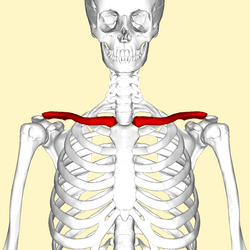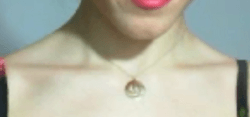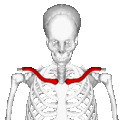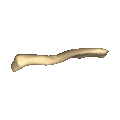Clavicle facts for kids
| Bone: Clavicle (collarbone) | ||
|---|---|---|
| Collarbone (shown in red) | ||
| Human collarbone | ||
| Latin | Clavicula | |
| Gray's | subject #49 200 | |
| MeSH | Clavicle | |
In human anatomy, the clavicle or collarbone is a long bone that serves as a strut between the shoulder blade and the sternum or breastbone. There are two clavicles, one on the left and one on the right. The clavicle is the only long bone in the body that lies horizontally. Together with the shoulder blade it makes up the shoulder girdle.
It is a palpable bone and in people who have less fat in this region, the location of the bone is clearly visible, as it creates a bulge in the skin. The clavicle is the most commonly broken bone. It can easily be fractured due to impacts to the shoulder from the force of falling on outstretched arms or by a direct hit.
Contents
Structure
The collarbone is a large doubly curved long bone that connects the arm to the trunk of the body. Located directly above the first rib it acts as a strut to keep the scapula in place so that the arm can hang freely. It can be divided into three parts: medial end, lateral end and shaft.
Development
The collarbone is the first bones to begin the process of ossification (laying down of minerals onto a preformed matrix) during development of the embryo, during the fifth and sixth weeks of gestation. However, it is one of the last bones to finish ossification at about 21–25 years of age. It consists of a mass of cancellous bone surrounded by a compact bone shell.
Variation
The shape of the clavicle varies more than most other long bones. In males it is thicker and more curved and the sites of muscular attachments are more pronounced. The left clavicle is usually longer and not as strong as the right clavicle. In males the clavicle is larger, longer, heavier and generally more massive than that of females.
Images for kids
See also
 In Spanish: Clavícula para niños
In Spanish: Clavícula para niños








